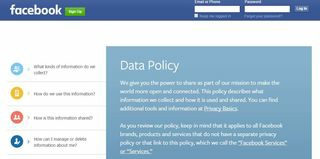Does Anyone Read Privacy Policies?
 A Wall Street Journal article describes how some progressive Internet companies are simplifying language in their privacy policies. Although most of us click through and "accept" policies to get to the page we want, some read them carefully. Increasing concerns about data use and information sharing has affected how people use some sites. According to a Pew study, most mobile app users didn't download at least one app because of personal information that would be collected.
A Wall Street Journal article describes how some progressive Internet companies are simplifying language in their privacy policies. Although most of us click through and "accept" policies to get to the page we want, some read them carefully. Increasing concerns about data use and information sharing has affected how people use some sites. According to a Pew study, most mobile app users didn't download at least one app because of personal information that would be collected.
The article further explains the move towards plain language:
"The effort to simplify privacy policy language is a response to public suspicion of opaque policies and the collection of ever more data, said Fatemeh Khatibloo, a Forrester Research Inc. analyst who studies privacy. Some companies "are finally getting on board with the idea that privacy - and how they use our data - is closely tied to trustworthiness," she said. In addition, they're trying to write policies that will be viewed favorably in Europe, which has set a higher bar than the U.S. for what counts as consent to use personal data."
A good example of a privacy policy is from the Plain Language Institute. This group's mission is to improve government communications. However, the Plain Language website is simple, and the group doesn't benefit from sharing information. Pinterest, Facebook, and other social media sites need to collect user data to improve user experience and garner advertising revenue.
This reminds me of our U.S. tax code: it's complex. Trying to simplify information too much may not serve users in the end.
We know that Facebook has struggled with its privacy policy since the network's inception. People never seem happy with it, and continuous changes to the policy and settings frustrate everyone.
Discussion Starters:
- Look at a few privacy policies for your favorite websites. How easily do you understand what's written?
- Compare policies for static sites, such as news portals, and interactive sites, such as social networks. What additional information are the social networks trying to cover?
